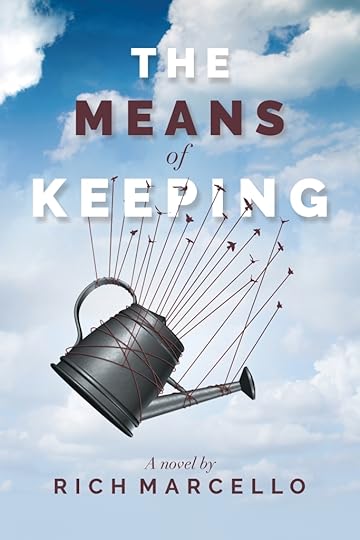The Means of Keeping is Out Today!

Dear Readers,
I’m thrilled to share some exciting news about my novel, “The Means of Keeping,” which was released today, July 12th, 2024. After three years of in-depth research and countless hours spent weaving together the intricacies of our current climate challenges with the emotional depth of human relationships, I am eager for you to experience this journey.
“The Means of Keeping” is a climate fiction novel that strikes a delicate balance between contemporary and literary storytelling. Set in a near-future America, it tells the story of lifelong friends, Tereza Allard and David Luca, who face the devastating consequences of a climate crisis-induced tragedy that claims the lives of their families. This novel explores their journey through grief, the rejuvenating power of friendship, and the indomitable human spirit striving for renewal through activism.
What makes this novel particularly close to my heart is not only the timely subject of environmental change but also the exploration of the profound impacts such crises have on personal lives. This story is a call to acknowledge the deep-seated fears we share about our planet’s future and a depiction of one path forward through community.
The narrative style of “The Means of Keeping” might remind readers of Kazuo Ishiguro’s introspective depth, combined with the environmental consciousness akin to Barbara Kingsolver. It is crafted for those who cherish not just a gripping tale but also a reflective lens on the pressing global issues that touch us all, whether directly or through the media we consume.
Both Tereza and David offer compelling portraits of resilience and complexity that, I hope, will draw you into their world. Their individual and shared experiences provide a deep well of empathy and understanding, making them characters that resonate across different audiences. Their story is not just about the endurance of their platonic love but also about the strength and healing that comes from facing one of humanity’s existential challenges together.
I had the privilege of receiving feedback from Rebecca Givens Rolland, author of “The Art of Talking with Children.” She notes, “With a beautiful, complex relationship between Tereza and David at the novel’s heart, and the terrifyingly familiar scenario of climate disaster as the setting, ‘The Means of Keeping’ is a real feat. Marcello’s meditations on the climate crisis are deftly communicated through an interpersonal web that feels lived in, moving, and, most importantly, real. It’s rare when platonic love is the centerpiece of a novel, and it’s also rare when a novel intelligently and empathetically engages with our responsibilities as citizens to the planet. ‘The Means of Keeping’ does both.”
I am deeply excited for you to dive into “The Means of Keeping” and join in this conversation about our world, our responsibilities, and how we can all contribute to a better future. Your engagement, dear readers, is what truly brings this novel to life, and I am looking forward to hearing your thoughts and discussions about the story and its implications.
Thank you for your continued support and for joining me on this incredible journey.
Warmly,
Rich Marcello
P.S. The reviews so far have been positive. Below are some of the highlights.
This semi-romantic, semi-post-apocalyptic novel spins an electrifying tale of love, loss, friendship, and activism in a climate-challenged near future America. Takeaway: Touching story of non-platonic friendship, loss, and grief amid climate disaster. Comparable Titles: Charlotte McConaghy’s Migrations, Meg Little Reilly’s We are Unprepared. ––Publishers Weekly Booklife
The concluding chapter is exceptionally well-conceived and touching and will move the audience. Readers concerned with climate change who are looking for a story that explores how it can drastically change lives may find this book is just what they are looking for. Some will likely list it as a favorite book of the year. ––The US Review of Books
Loved it! With its haunting prose and evocative imagery, the novel invites us to envision a future where love, resilience, community, and a strong commitment to our planet guide us towards regaining our collective humanity. ––Reedsy Discover
Marcello’s prose is elegant and evocative, capturing the nuances of human emotions with sensitivity and depth. The environmental challenges mirror the characters’ internal turmoil, emphasizing the interconnectedness of personal and global crises. The narrative prompts readers to reflect on how individual experiences intertwine with broader societal issues, urging collective action in the face of adversity. Marcello’s profound examination of characters’ emotions, motivations, and relationships results in an immersive and thought-provoking experience. A beautifully crafted novel that delves into the depths of grief, love, and resilience with grace and insight. ––The Prairies Book Review
When reading The Means of Keeping, tread carefully into each chapter. Be intentional with the process. Carve out a weekend for yourself. Or an hour out of however many days it’ll take you to make your way through this book. Otherwise, you might find yourself stealing minutes out of your daily routine, condensing tasks to free up enough precious time to sneak in a paragraph or two here and there, squeezing in a few pages in environments that will just barely grant you the permission to. At the end of it, you will want to sit with your feelings. To hold them in both hands and turn them around, viewing them from all angles to better make sense of them. Parts of us all are hidden in this book and we may need to confront the difficult emotions dredged up by this story. In the end we will be better for it. The book will sit beside you with patience as you do so. As will Tereza and David. The answers you seek, or the comfort you need lies somewhere in their tribulations. Marcello possesses the rarest of talents. He takes a universal problem and distills it down to its essence. He writes words that resonate. Words I wish I could untangle from the sticky web of my thoughts just so I could read them afresh, with brand new eyes, and learn something new that I might have missed the first time. Then do it all over again for, perhaps, a lifetime. ––BookNerdection



